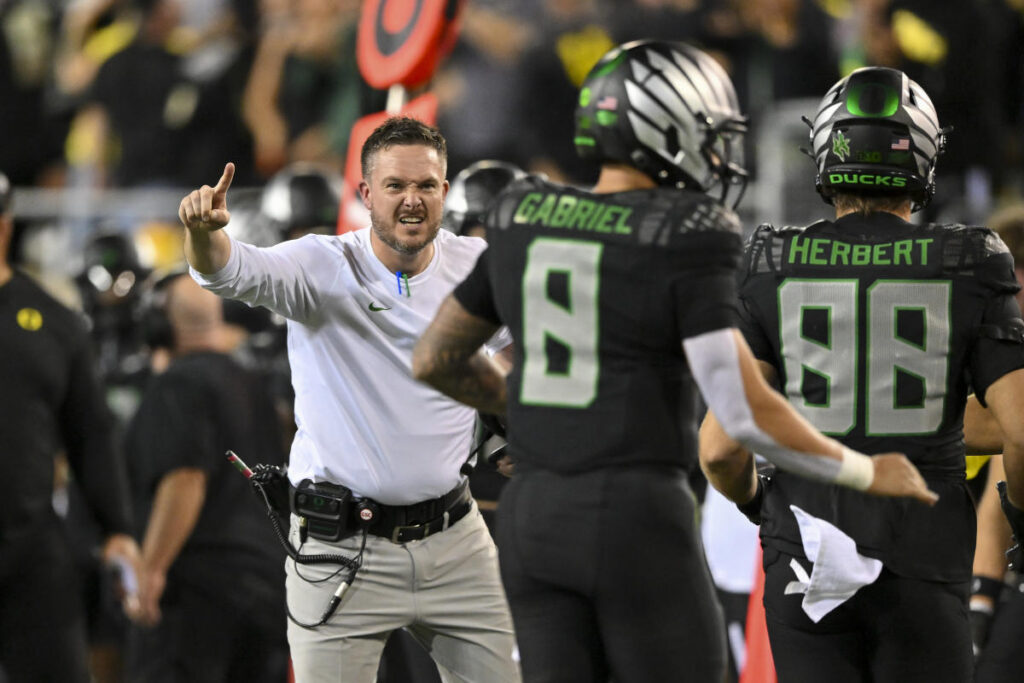In the recent college football matchup between Oregon and Ohio State, a controversial coaching tactic employed by the Oregon Ducks has sparked potential scrutiny from the NCAA. With mere seconds remaining on the clock in a tightly contested game, Oregon called a timeout while Ohio State was in a desperate attempt to position themselves for a game-winning field goal. Following the timeout, Oregon coaches made an unconventional decision by sending 12 defenders onto the field for a critical third-down play. This strategic move resulted in an incomplete pass for Ohio State, leaving them with only six seconds to play. This tactic has since received attention because, unlike in the NFL, NCAA rules do not reset the game clock for an infraction involving too many players on the field, allowing Oregon to effectively use the penalty to their advantage.
By this rule, Oregon’s decision essentially traded an offside penalty for a critical advantage. The five-yard penalty incurred did not just stop the play; it also eliminated precious seconds from Ohio State’s chances of scoring, which adds a layer of controversy to their tactics. The Ducks exploited a loophole that allowed them to add an extra player to the defense on a crucial passing down while simultaneously managing to burn valuable time off the clock. This decision, seen as clever by some, has drawn the attention of NCAA officials who are now evaluating the implications of such actions on the sport and whether they undermine the fairness of competition.
Steve Shaw, the NCAA secretary rules editor, has remarked that the NCAA Football Playing Rules Committee is closely reviewing the situation. While he acknowledged that the officiating crew from the Big Ten managed the game correctly according to existing rules, the committee is considering revisions that would more effectively address this exploitative tactic. The dialogue has intensified around this incident, with Shaw stating that the goal is to ensure that penalties do not ultimately benefit the team that commits them. This situation highlights the ongoing tension between strategic creativity in coaching and the integrity of the game.
Historically, the NCAA has responded to such “fair play” issues with the issuance of interpretation bulletins during the season, which guide officials on how to handle similar situations in the future. In the past, these interpretations have aimed to discourage teams from taking advantage of loopholes and to reinforce the principle that penalties should serve as a disadvantage rather than a strategic maneuver. While mid-season adjustments to rules interpretations are somewhat uncommon, they are historically used to ensure that teams are not rewarded for actions that circumvent the spirit of the game.
Oregon head coach Dan Lanning’s comments following the game indicated that the Ducks prepared for this scenario, suggesting that the team had practiced for such a unique situation. By inserting an extra defensive back in anticipation of an obvious passing situation, Lanning and his staff demonstrated a willingness to push the boundaries of established rules in college football. His reference to spending significant time preparing for unusual game situations further emphasizes the strategic depth at play in his sideline decisions, sparking debate over the ethics of such tactics within the competitive landscape of college sports.
As the NCAA deliberates on the potential ramifications of the Oregon-Ohio State game and the broader implications of allowable coaching strategies, the outcome may lead to changes aimed at preserving fairness in college football competitions. Should the committee decide to enact new interpretations or rules to address such situations, it may result in a broader reevaluation of how teams prepare and strategize within the framework of the game. This incident exemplifies the ongoing evolution of NCAA rules and the continuous search for balance between creativity in coaching and maintaining sportsmanship in college athletics.

